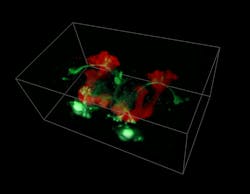Leica Microsystems, Columbia University team to develop and market SCAPE microscopy
Leica Microsystems CMS (Wetzlar, Germany) has entered into an exclusive, worldwide licensing agreement with Columbia University (New York, NY) to commercialize swept confocally aligned planar excitation (SCAPE) microscopy, a method developed at Columbia that forms 3D images of living samples by scanning them with a sheet of laser light.
Related: Neuroscience trailblazer wins BRAIN Initiative grant for high-speed microscopy method
SCAPE microscopy was developed in the laboratory of Elizabeth Hillman, Ph.D., associate professor of biomedical engineering and radiology at Columbia University and a principal investigator at Columbia's Mortimer B. Zuckerman Mind Brain Behavior Institute. As the method is able to scan and image a moving light sheet through a single, stationary objective lens, it delivers 3D imaging speeds that are 10–100 times faster than conventional point-scanning microscopes while maintaining the benefits of light-sheet imaging, including low photodamage.
The technology was recognized in late 2015 with a grant award from the National Institutes of Health BRAIN Initiative.

